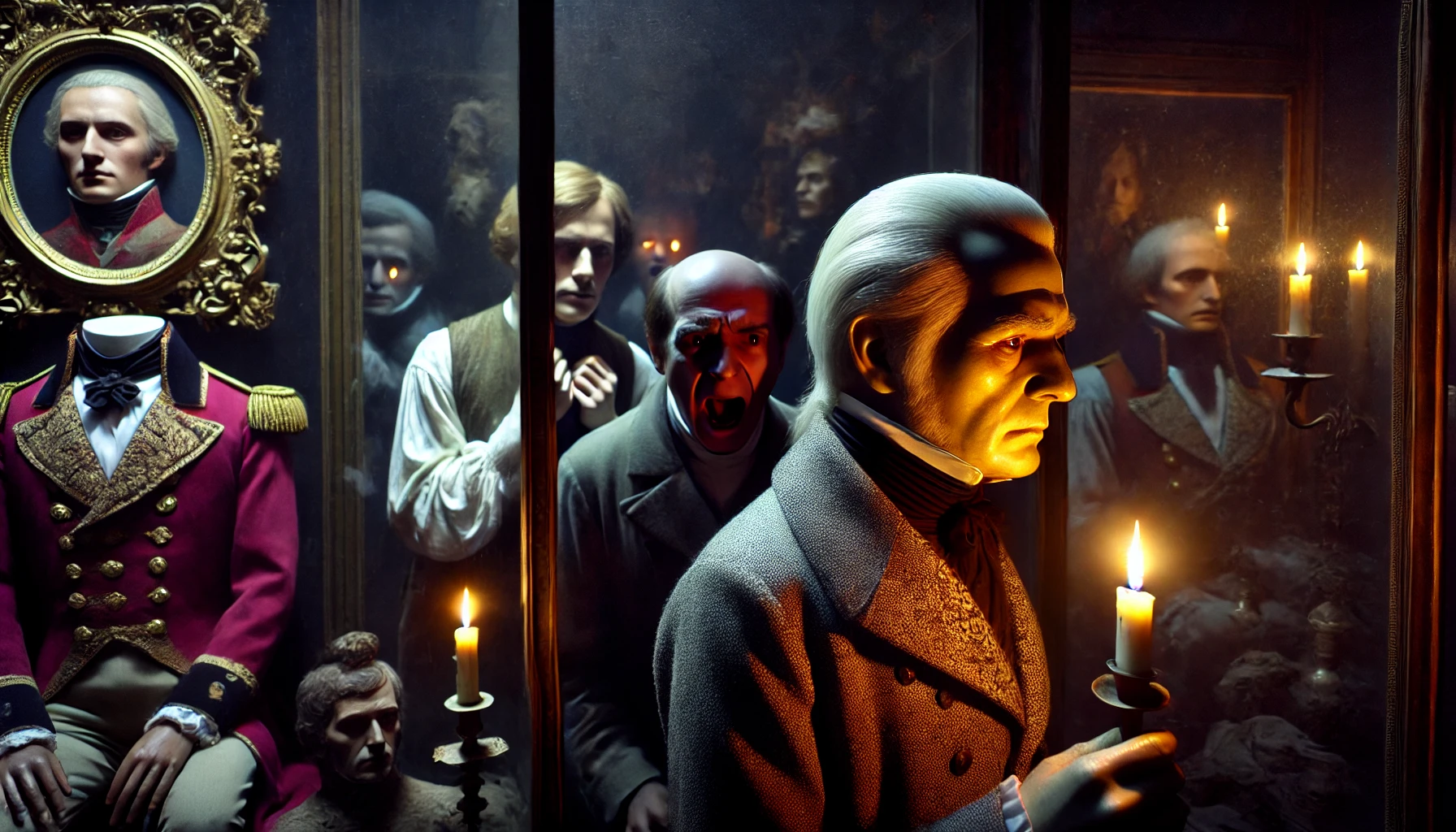Cleveland Moffett’s short story The Mysterious Card, first published in The Black Cat magazine in 1895, tells the story of Richard Burwell, an American who receives an inexplicably ominous card in Paris. This cryptic tale thrusts Burwell into a spiral of confusion, rejection, and despair, leaving readers on edge as they are led deeper into the mystery. Notably, The Mysterious Card was followed a year later by The Mysterious Card Unveiled, which reveals the secrets behind the strange message.
Plot Summary
Richard Burwell, an American businessman from New York, arrives in Paris, seeking a break from his routines and eager to experience the renowned elegance and culture of the city. His wife and daughter remain in London, visiting friends, so he explores Paris alone, finally deciding to visit the famous Folies Bergère. Inside the lively venue, he marvels at the dazzling crowd. He drifts into the garden, basking in the music, the murmurs of people, and the glow of the lanterns. Suddenly, his attention is seized by a woman with striking beauty and poise, her eyes shining with a strange, knowing glint. She stands out, a stark contrast to her bustling surroundings, as if she were some enchantress spun from mystery.
In an inexplicable moment, the woman, breaking away from her male companion, approaches Burwell and leaves a card on his table with a soft, alluring gesture. Before he can react, she disappears back into the crowd, leaving him in stunned bewilderment. The card she left bears words in purple ink, carefully inscribed in French. Unfortunately, Burwell cannot read French, and the meaning of the words remains a frustrating mystery. As he stares at the strange card, he is overcome by a consuming need to decipher it. What could these words hold, and why would a complete stranger entrust him with them?
As he returns to his hotel, Burwell decides to approach the hotel manager, hoping for a quick translation. But upon reading the card, the manager’s face darkens in sudden horror, and with a cold firmness, he orders Burwell to leave the hotel immediately. Stunned by this reaction, Burwell’s frustration mounts. What could the card possibly contain to elicit such a reaction? Seeking refuge, he moves to another hotel, determined to shake off the unsettling encounter. But when he shows the card to the new hotel owner, the man reacts similarly, refusing him lodging and leaving Burwell deeply disturbed. Feeling a dark cloud settling over him, Burwell becomes ever more consumed by an obsession to understand the card’s message.
As he spends days wandering Paris, the mysterious card burns like a curse in his pocket. The words weigh heavily on him, filling him with a nameless dread. He avoids sharing it with others, lest they react in the same horror as those before them. Alone in his torment, he finally decides to confide in a friend from Boston who is staying in Paris. Initially sympathetic, the friend assures Burwell that this strange reaction must simply be a misunderstanding. But as soon as the friend glimpses the card, his face pales, and he too withdraws from Burwell. Offering only the flimsiest of excuses, he leaves Burwell’s company without any explanation.
Now cut off from all comfort, Burwell feels Paris’s lights turn dim and ominous. His hope dwindles, yet he is driven by a growing desperation. His search for understanding becomes frantic as he wonders what shadowy power the card holds, a message that seems to poison everyone who reads it. In a final effort, he approaches a detective agency, hoping they might solve the mystery without reacting with the same inexplicable horror. To his immense relief, the detective shows no visible reaction to the card, but still declines to translate it. Instead, he promises to resolve the matter soon.
The following day, Burwell’s torment intensifies as the detective returns, accompanied by a stern officer, and instructs Burwell to follow them. Perplexed, Burwell’s protests are ignored, and he is taken to police headquarters. Here, he undergoes relentless questioning, the full weight of his dread settling upon him as he realizes his situation is graver than he had imagined. His anxiety reaches its peak when, with no explanation, he is escorted to the infamous Conciergerie prison. In a burst of desperation, he contacts the American Legation, demanding aid as an American citizen. Yet even the Legation’s representative, though sympathetic, gives him no clear answer, and he too avoids looking at the card.
Finally, after a harrowing night in the cell, Burwell receives news that he will be freed on the condition that he leaves France within twenty-four hours and swears never to return. Stunned by the severity of the sentence and the silence surrounding the matter, Burwell boards a train to London that night. The city of light and romance has turned hostile and unforgiving, banishing him without explanation. Reaching London, he reunites with his wife, but a heaviness clings to him. He debates whether to confide in her but quickly realizes that she senses his deep turmoil. When she presses him, he reveals everything, placing the mysterious card into her hands, desperate for her insight and support.
But his wife, upon reading the card, is gripped by a horrified fury. She calls him a monster and vows to leave him, abandoning him without a shred of the warmth they once shared. No matter his pleas, she refuses to explain her reaction, and Burwell finds himself alone once again, the card now a poison that has consumed his marriage. With nothing left for him in Europe, he returns to New York, his heart burdened with bitterness and defeat. He hopes his old friend and business partner, Jack Evelyth, might offer comfort, hoping against hope that Evelyth will not react like the others.
In the familiar surroundings of his friend’s home, he tells Evelyth his story, expecting solace but encountering yet another nightmare. Evelyth, too, becomes shaken when he reads the card, though he does not outright reject Burwell. The burden of the card’s words, however, is too great even for their friendship, and Evelyth, overcome with sorrow, insists they dissolve their business partnership. In a final parting, he offers Burwell a generous financial settlement, but their friendship is effectively severed, another casualty of the card’s curse.
Burwell’s life has unraveled completely. The card has robbed him of his marriage, friendships, and peace, and yet he is no closer to understanding its significance. Each day, he finds himself drawn to the card, his gaze transfixed by the swirling purple words, even as he recoils from it. At last, he resolves to learn French, determined to uncover its meaning himself, though every step is marked by dread and a growing sense of doom.
One day, as he crosses a New York street, he spots a familiar face—the woman who handed him the card in Paris. Driven by desperation, he follows her to her home, his need for answers overwhelming any caution. Despite her weakened state, she recognizes him, and he implores her to reveal the card’s meaning. As she struggles to speak, a fatal coughing fit takes her, and she collapses, succumbing to the same silence that has haunted Burwell’s life.
In horror, he realizes the writing on the card has vanished entirely, leaving only a blank surface, a haunting symbol of his ruined life. The woman dies with her secret, leaving Burwell in a fate as blank and unfathomable as the card in his hand.
Main Characters
- Richard Burwell: A New York businessman visiting Paris, Burwell’s world is thrown into chaos after receiving a card from an unknown woman. Burwell’s confusion and growing desperation intensify as everyone who reads the card reacts with horror, distancing themselves from him. His journey is driven by a relentless desire to understand the meaning of the card.
- The Mysterious Woman: Elegant and elusive, she hands Burwell the card with a cryptic smile, setting off the chain of events. Her intentions remain obscure until Burwell finally finds her again, only for her to die before revealing the card’s meaning.
- Burwell’s Wife: Although she begins as his supportive spouse, upon reading the card, she is overcome with revulsion and declares Burwell a monster, abandoning him permanently.
- Jack Evelyth: Burwell’s longtime friend and business partner, whose loyalty dissolves after he, too, reads the card. Evelyth is torn by loyalty and shock, ultimately choosing to end his partnership with Burwell rather than explain the card’s meaning.
Theme
- Isolation and Alienation: As Burwell tries to uncover the card’s meaning, he finds himself increasingly isolated, shunned by his wife, friend, and even strangers. This isolation emphasizes the alienating power of mystery and how secrets can turn once-close relationships to ruin.
- Obsession with the Unknown: Burwell’s obsession with the mysterious card represents humanity’s compulsion to understand and unravel the unknown, even at great personal cost. His determination to find answers spirals into a nearly self-destructive fixation.
- The Power of Language: The story explores how language both connects and divides. Burwell’s inability to read French isolates him from the truth, and by extension, his loved ones. The card’s message, indecipherable to him but understood by others, symbolizes language as a bridge and a barrier.
- Fate and Free Will: The story raises questions about fate’s role in Burwell’s downfall. Was his life derailed simply by chance, or was he always fated to meet this mysterious woman and the ensuing doom that followed?
Writing Style and Tone
Cleveland Moffett crafts The Mysterious Card with a suspenseful and Gothic-inspired tone, infusing each scene with an air of dread and mystery. His language is straightforward, almost journalistic, yet it builds a strong atmosphere of suspense that compels readers to share Burwell’s sense of foreboding. Moffett’s use of concise, descriptive phrases and dialogue paints a vivid picture of each moment of confusion and rejection, while avoiding unnecessary exposition.
The tone is intensely unsettling, leaving readers in the same bewildered state as Burwell, who becomes increasingly paranoid and frustrated. Moffett’s choice not to reveal the card’s contents amplifies this mystery, focusing instead on Burwell’s reactions and the profound impact on his relationships. This creates a psychological puzzle that engages readers’ curiosity and imagination, inviting them to question what could have been on the card that so dramatically altered the lives of everyone who encountered it.
We hope this summary has sparked your interest and would appreciate you following Celsius 233 on social media:
There’s a treasure trove of other fascinating book summaries waiting for you. Check out our collection of stories that inspire, thrill, and provoke thought, just like this one by checking out the Book Shelf or the Library
Remember, while our summaries capture the essence, they can never replace the full experience of reading the book. If this summary intrigued you, consider diving into the complete story – buy the book and immerse yourself in the author’s original work.
If you want to request a book summary, click here.
When Saurabh is not working/watching football/reading books/traveling, you can reach him via Twitter/X, LinkedIn, or Threads
Restart reading!








